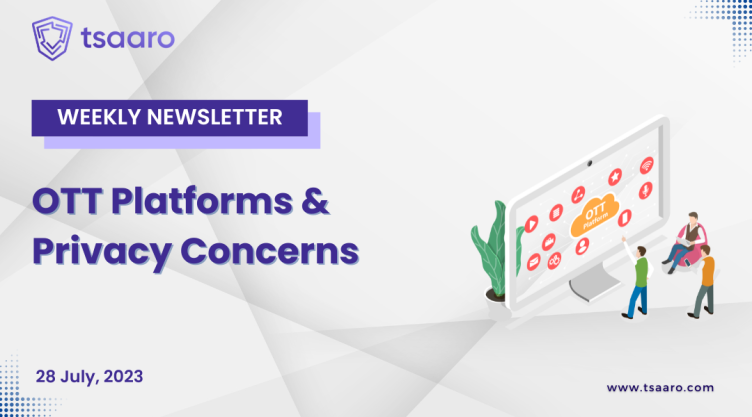
Introduction:
In recent years, the rise of Over-the-Top (OTT) platforms has revolutionized the way we consume media content. These video streaming apps, such as Netflix, Prime Video & Amazon Studios, and Disney+ Hotstar, provide users with unparalleled access to a vast array of movies, TV shows, and original content.
While the convenience and diversity offered by these platforms are unquestionable, there is a growing concern surrounding user privacy. This newsletter delves into the privacy concerns associated with OTT platforms and explores the measures that need to be taken to safeguard user data effectively.
Data Collection Practices:
OTT platforms collect a significant amount of user data, ranging from basic registration information to detailed viewing habits and device data. This data is used to personalize content recommendations and improve user experience, but it also raises privacy concerns. User profiles created from collected data can become highly detailed and may include sensitive information that users might prefer to keep private.
Third-Party Data Sharing:
One of the primary privacy concerns with OTT platforms is the sharing of user data with third-party companies for various purposes, such as targeted advertising or analytics. While some level of data sharing may be necessary for business operations, users often feel uneasy about their data being shared with unknown entities, especially if these entities lack robust data protection policies. Striking a balance between targeted content delivery and user privacy becomes a challenge for these platforms.
Data Security and Breach Risks:
Data security is a critical aspect of any online service, and OTT platforms are no exception. The vast amount of user data they handle makes them lucrative targets for cybercriminals. A data breach could result in personal information, viewing history, and payment details falling into the wrong hands. Consequently, ensuring robust security measures and implementing data encryption protocols are imperative for maintaining user trust.
Informed Consent and Transparency:
To address privacy concerns, OTT platforms must prioritize transparency and obtain informed consent from their users regarding data collection and sharing practices. Providing clear and easily understandable privacy policies and terms of service is crucial. Users should have the option to opt-out of certain data collection activities if they wish, without sacrificing core functionalities of the platform.
The Role of Regulation:
In recent years, there has been a growing call for increased regulation of OTT platforms concerning user data privacy. Governments and regulatory bodies have a responsibility to safeguard user rights and ensure that these platforms adhere to best practices in data handling.
Privacy laws, such as the General Data Protection Regulation (GDPR) in Europe, serve as essential steps towards protecting user privacy. Striking a balance between innovation in the industry and user data protection is an ongoing challenge for policymakers.
Data Anonymization and Aggregation:
To alleviate privacy concerns, OTT platforms can adopt data anonymization and aggregation techniques. By stripping data of personally identifiable information (PII) and aggregating it, platforms can still derive valuable insights while minimizing the risk of individual user identification. This practice ensures that user privacy is respected without compromising the platform’s ability to offer personalized content recommendations.
User Education and Control:
Empowering users with greater control over their data is key to addressing privacy concerns. OTT platforms should provide users with accessible tools to manage their data preferences, including the ability to review and delete collected information. Additionally, educating users about the platform’s data practices and the importance of privacy protection can foster a greater sense of trust and transparency.
Conclusion:
OTT platforms have undeniably transformed the way we consume media, offering unparalleled convenience and content variety. However, these platforms must grapple with the privacy concerns associated with their data collection practices. Striking the right balance between personalization and user privacy is vital to ensure a positive user experience.
By prioritizing transparency, adhering to robust security measures, and respecting user consent, OTT platforms can safeguard user data effectively and maintain their position as leaders in the digital entertainment landscape. Regulatory support, along with user education and control, will play pivotal roles in achieving this balance and fostering trust between users and these innovative video streaming platforms.
Major Privacy Updates of the Week

India's Digital Personal Data Protection Bill, 2023 has been released Standing Committee on IT:
The Digital Personal Data Protection Bill, 2023 (DPDP Bill) was recently released by the Standing Committee on IT headed by Mr Prataprao Jhadav. The Bill was not formally referred to the Standing Committee and the Opposition claimed that none of them were aware of the Report on the Bill until the eve of the meeting. As a result of which, the opposition members walked out of the meeting and the Report was adopted in their absence.
The new DPDP 2023 makes several modifications to the old draft including changes to the Cross Border Data transfers and addition of Legitimate Interest. Read More

Meta fined $14 million for undisclosed data collection by an Australian Court:
An Australian court has ordered Meta Platforms, the owner of Facebook, to pay fines amounting to A$20 million for collecting user data through the app “Onavo” without revealing its actions to users. During the period of early 2016 to late 2017, the app was promoted as a tool for safeguarding personal information, but it secretly gathered users’ location, activity, and browsing data for its own commercial purposes.
The court acknowledged that Meta could have faced even more substantial fines given the number of Australian users (271,220 downloads), but treated the violations as a single course of conduct. Read More

Data Protection Authority of Norway bans behavioral advertising by Facebook and Instagram:
Norway’s data protection authority, Datatilsynet, has issued a temporary ban on the behavioral advertisement on Facebook and Instagram (subsidiaries of Meta) following EU’s Court of Justice Ruling on Meta’s behavioral advertising being incompatible with the GDPR.
However, the ban shall only take effect from August 4th for a Period of three months. Failure to comply with this ban shall result in a fine on Meta of NOK 1 million (€88,600) per day. This ban only targets behavioral advertising and does not ban Personalized advertising of Instagram or Facebook in Norway. Read More

Breach compromises Norwegian government ministries:
According to Norway’s Security and Service Organization, 12 Norwegian government ministries were caused in a Data Attack. Hackers exploited a zero-day flaw in Ivanti’s mobile endpoint management software, affecting multiple Norwegian government ministries. The vulnerability (CVE-2023-35078) allows unauthorized remote access to personal information without credentials and the potential creation of an administrative account for further system changes. Ivanti released a patch and engaged with customers to apply the fix but initially withheld details behind a paywall.
The full impact of the attack remains uncertain, with over 2,900 exposed MobileIron portals, including numerous unpatched U.S. and U.K. government departments, posing additional risks. Read More.

Dark Web Markets Offer New FraudGPT AI Tool:
Cybersecurity experts have identified “FraudGPT,” a new AI tool circulating on the Dark Web and Telegram channels. The tool offers cyber-criminals an all-in-one solution, enabling them to craft spear-phishing emails, generate undetectable malware, create phishing pages, and access hacking tutorials.
The threat actor behind FraudGPT shifted from Dark Web to Telegram for stability and has garnered over 3000 confirmed sales and reviews. Combatting this threat requires continuous innovation in cybersecurity defenses, and security awareness and behavior change training have been shown to reduce failure rates in phishing attacks. Read More
Curated by: Prajwala D Dinesh, Ritwik Tiwari, Ayush Sahay
WEEKLY PRIVACY NEWSLETTER
Keep up to pace with this high-impact weekly privacy newsletter that
features significant data privacy updates, trends, and tools that can
help to make your life secure & easier every day!
*By clicking on subscribe, I agree to receive communications from Tsaaro


